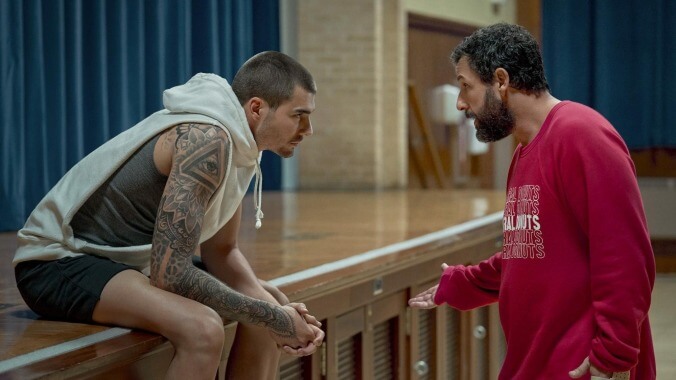In Hustle, Adam Sandler's hoop dreams follow a familiar but satisfying playbook
Two souls adrift in their basketball careers get back in the game in a feel-good sports film full of humor and heart

Sports-themed movies are at their best when they focus on the human-interest story at their core. Director Jeremiah Zagar’s Hustle scores points for doing just that efficiently and effortlessly, delivering a nimble, quick-footed feature about a basketball scout whose search for the perfect player yields personal dividends that outweigh the professional ones. Though it follows a by-the-numbers plot, borrowing pages from the playbooks of The Air Up There and My Giant, its compelling character drive and exhilarating technical craftsmanship more than make up for its narrative familiarity.
Philadelphia Sixers talent scout Stanley Sugarman (Adam Sandler) has grown exhausted by the demands of his job, leapfrogging all over the world from plane to plane, hotel to hotel, and court to basketball court. Not only has it taken him away from his loving wife Teresa (Queen Latifah) and their aspiring filmmaker daughter Alex (Jordan Hull), it’s drastically dulled his career ambitions to one day coach the team he loves. His sacrifice and determination, however, have not gone unnoticed by Sixers owner/longtime friend Rex (Robert Duvall)—who promotes him to assistant coach, but dies shortly thereafter.
The tragedy leaves Stan’s position in jeopardy with the new owner, Rex’s smug, contentious son Vince (Ben Foster). In desperate need of a winning move, Stan travels to Spain, where he serendipitously witnesses streetball player Bo Cruz (NBA player Juancho Hernangómez) put the “wow” sound in “crowd.” He’s tall, talented, and tender-hearted, prizing his close relationship with his mother (Maria Botto) and precocious young daughter (Ainhoa Pillet). He’s also a virtual unknown with a troubled past. The two underdogs launch a quest to connect and prove themselves to their peers. But just as the pair begin to reach lofty heights, seemingly insurmountable challenges threaten to set them back.
In between the formulaic and familiar story beats, screenwriters Taylor Materne and Will Fetters dig into the unspoken subtext that gives the characters their dynamic motors. Stan and Bo’s internal and external stakes are clearly defined and palpable, as is Vince’s modus operandi as he lashes out against Stan, his father’s favored surrogate son. Women in their world, who are traditionally tertiary in films like this, are blessedly important: Teresa, Alex, and Katherine (Heidi Gardner), Vince’s corporate-stock-holding sister, are integral forces who flex their own agency while augmenting the male arcs.
While the script delivers on the expected, it’s Zagar and his creative collaborators’ stylistic flourishes that provide the unexpected. The picture houses an incredibly affecting use of montage, musicality, and composition. This is best demonstrated in the electrifying second act training sequence—an obligatory inclusion in any good sports movie, but ingeniously improved upon by this team’s propulsive sound and vision. This segment is visually and audibly symphonic, blending a rousing hip-hop banger with Dan Deacon’s score, cinematographer’s Zak Mulligan’s effused lighting and sharp cuts by editors Tom Costain, Brian M. Robinson and Keiko Deguchi. It mimics the intense focus and revving engine inside the athlete’s psyche, helped along by Sandler’s motivational hollering.
Sandler gives an open-hearted, humanistic performance as a down-on-his-luck, disheartened soul hungering for a challenge and change, staying within well-guided boundaries of likability. He’s an assured actor, as adept with levity as with the role’s more dramatic challenges. Newcomer Hernangómez makes a formidable screen partner for Sandler, delivering vulnerability and nuanced grace. Also noteworthy, the bevy of basketball-star cameos doesn’t bog down any momentum; their addition—which in any other feature would be seen as a cheap ploy—gives the picture an air of authenticity.
That said, occasionally clunky aspects cause a few minor distractions. The approaching act changes feel distracting and foreshadow conflicts executed with less finesse than benefits the film. The script also spells everything out instead of having confidence in its audience. And, despite being sewn into a big character-building development, the pivotal moment where something goes viral feels contrived—as much as anything because most of the rest of the film doesn’t rely on those sorts of conveniences.
While not a total slam dunk, Hustle plays admirably with a lot of passion, artistry, and intelligence. Predictable struggles surprisingly lead to resonant depths, showcased in both its technical proficiency and some soul-stirring sentiments about rising above adversity. And while directing the audience to look one way, the filmmakers brilliantly zig-zag another, providing added depth and dimension to these characters’ conundrums. In a stacked book of familiar plays, it’s perhaps this film’s shrewdest maneuver.